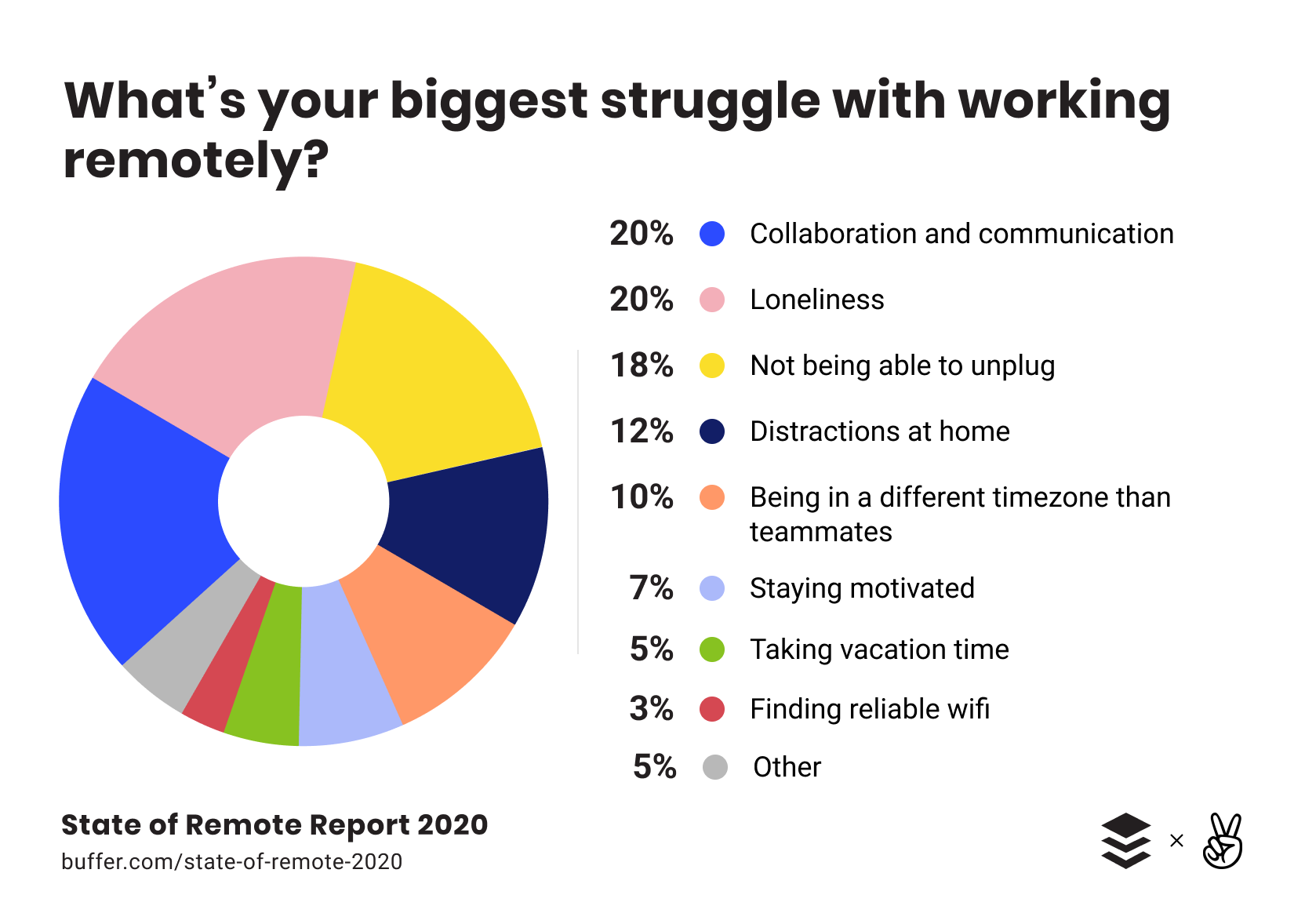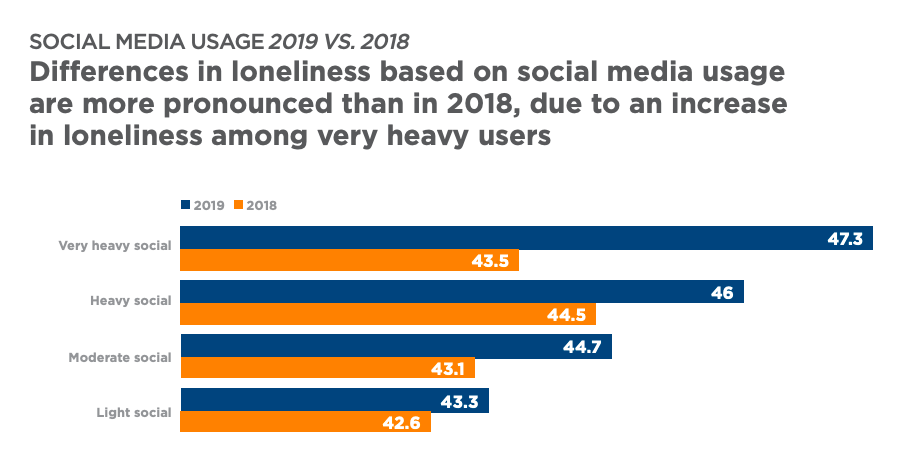For creatures as social as human beings, there’s nothing quite as torturous as being and feeling alone. When you work from home, you’re already deprived of the friendly banter and chance encounters that happen in an office. When you work from home during a pandemic, you have the added burden of not being able to socialize in the same way that you would under normal circumstances.
So what can you do when you feel lonely at work and your workplace is your own home? First, take heart: Loneliness is common, even for people who live with family or roommates. According to Cigna’s 2020 Loneliness and the Workplace report, three in five American adults are lonely. Second, read on to take a closer look at loneliness: what it means, what science says about it, and how you can overcome it.
But First, What Is Loneliness?
While the Merriam-Webster dictionary says that lonely means “being without company” or “sad from being alone,” we all know that one can be surrounded by people and feel sad just as easily as one can be alone and feel content.
Relationship coach Kira Asatryan offers a richer definition in her book Stop Being Lonely:
“Loneliness is essentially sadness caused by a lack of closeness, also known as sadness caused by distance. This is why it doesn’t work to simply surround yourself with people. You must actually feel close to them.”

Former U.S. Surgeon General Dr. Vivek Murthy sees loneliness as a public health concern. His definition, as told to NBA.com, is as follows:
“Loneliness is different than isolation and solitude. Loneliness is a subjective feeling where the connections we need are greater than the connections we have. … You can be surrounded by many people but still feel quite lonely if you don’t have strong connections and if you feel you can’t be yourself with them.”
So before delving into the rest of this article, I’d like you to divorce the definition of loneliness from the idea of being physically alone.
How Does Being Lonely at Work Affect You?
Workplace Loneliness Hurts Job Performance
One study on nurses in a public hospital in Turkey found that the more lonely they were at work, the lower their job performance.
Another study found that higher workplace loneliness corresponded to lower job performance for two reasons: lonely employees are less approachable and less committed to their organization.
Feeling Lonely Decreases Job and Life Satisfaction
One study of elementary school teachers in Turkey found that a lack of social friendships at work decreased job satisfaction.
A study in Iran confirmed previous research that lonely people have lower levels of life satisfaction. Further, it found that emotional loneliness (a lack of close relationships) is more painful than social loneliness (a lack of social friendships).
Loneliness Is Bad for Your Health
A meta-analysis of 148 studies found that a lack of social relationships influences the risk of death as much as smoking and alcohol consumption—and exceeds that of physical inactivity and obesity. In fact, researchers found that those with stronger social relationships are 50% more likely to survive than those with weaker social relationships.
Remote Workers Are Especially Prone to Isolation and Loneliness
Compared to office workers, remote workers are more likely to report a lack of companionship and feeling isolated from others, according to Cigna’s 2020 Loneliness and the Workplace report.
And Buffer’s 2020 State of Remote Work report found that loneliness once again showed up as one of the top three struggles for remote workers.

7 Ways to Combat Work From Home Loneliness
Given the negative effects of workplace loneliness and its disproportionate impact on remote workers, is there anything you can do to feel connected again? Thankfully, yes!
1. Lay Off the Social Media
The Cigna report found that the more you use social media, the more lonely you’ll probably be. For example, light social media users had an average loneliness score of 43.3, while moderate users had an average score of 44.7. The most lonely of all, though, were the very heavy social media users, clocking in at 47.3.

Social media is tricky because it lends the illusion of closeness without the reality of it. You can “like” and comment on Facebook photos of your friend’s baby shower, but you’ll still be painfully aware that you’re not experiencing the moment with them and that those photos weren’t intentionally shared with you, but to their hundreds of “friends” on Facebook.
So, when you’re feeling lonely, instead of watching Instagram stories of your friends at birthday parties and pool hangouts you weren’t invited to, text one of them and ask if they’d like to do a video chat, or go for a walk outside and say hello to a neighbor.
2. Join a Coworking Space
During the coronavirus pandemic, some remote workers are even doing virtual coworking sessions, where they all join a Zoom meeting, have a short chat, and get to work. Sometimes just knowing others can see you and that you’re all working at the same time (even if not in the same place) can stave off loneliness.
3. Find Your Community Online
Sometimes we feel lonely because we don’t feel like we belong to a group that shares our values or interests. Thankfully, in this day and age, there’s an online community for nearly every interest.
Some places where you can begin your search:
- Meetup.com features in-person and online events based on interests. It’s free to join.
- Nomad List is an online repository of information about the best places around the world for digital nomads. It also offers a paid membership where you can access premium resources and a Slack group with others who work remotely and travel the globe.

- Freelancers Union represents independent workers by providing community events and educational resources as well as advocating for laws and policies that protect freelancers. Membership is free.
- Facebook groups are free to join and cover nearly every interest and industry imaginable. Just search for keywords such as “work from home” or “remote workers.”
4. Recognize That Technology Cannot Completely Replace In-Person Interaction
As wonderful as technology is at facilitating social interaction (especially during a pandemic!), it cannot serve as a replacement for in-person exchanges. In fact, Cigna’s study found that participants who interact with other people on a daily basis have an average loneliness score that is nearly 20 points lower than those who never have in-person interactions.
5. Get Outside
When you go outside—whether it’s for a walk around your neighborhood or a work session at your fave coffee shop—your chances of in-person social interactions greatly improve. Add to that the proven health benefits of the great outdoors, and you’ve got a mood booster in the making.
6. Nourish Personal Relationships
Even if you were working inside a crowded office, you wouldn’t have been immune to loneliness. So it’s not always the nature of your work that leads to loneliness—it could be that your personal relationships need some nourishment.
So instead of thinking of work from home loneliness as a work problem, consider it a personal issue too. You don’t necessarily need to connect with colleagues or find fellow freelancers to become friends with. Start fostering the relationships in your personal life with your significant other, roommate, family member, and friends.
7. Practice Vulnerability
The antidote to loneliness, as we learned from Kira Asatryan, is closeness—but people can’t get close to you if you have your defenses up. The important thing to note here is that not everyone deserves your vulnerability, only those who have earned your trust.
Some action steps to practice vulnerability:
- Be honest about how you feel. The thing about loneliness is that we’re often too ashamed to admit that we’re feeling it. Rather than creating closeness with others, our silence closes us off from them. So if a friend asks you how you’re feeling, be honest about it. It will let them know you need extra support.
- Ask for what you need. It can be scary to ask for what you need because your request may be rejected, but often, it’s the only way someone can know how to help you. For example, at the beginning of quarantine, a friend sent me a straightforward text message: “I need to hear from you every day.” That let me know that she was struggling and that I could help her by checking in daily.
- Model the behavior you’d like to see from others. When you’re lonely, it can be easy to withdraw from society and stop checking in with friends. But this has a compounding effect on your loneliness because people will assume you’re doing fine and give you space. Instead, do the things you wish others would do for you. Send your friend a funny GIF, invite them for a hangout, or give them a call. You’ll be surprised by how much your efforts will be reciprocated.
If you decide to make a call, make sure to turn on Krisp so no background noise passes through.
[demo]
There’s Hope for Those Who Are Lonely at Work
If you’re feeling lonely at work, there’s nothing wrong with you, and it’s not a reflection of your value as a person or employee. Isolation is just one of the pitfalls of working from home that we have to overcome.
Because loneliness is a lack of closeness in your relationships, it’s not enough to surround yourself with people. Cultivate closeness by joining groups with like-minded people, distancing yourself from technology and social media, and allowing yourself to be vulnerable with those you trust.
I’d like to leave you with a challenge: If you’re experiencing work from home loneliness, tell someone. It’s even better if they work from home, too, or are a close friend. Chances are, you’ll find you’re not alone in feeling lonely.



